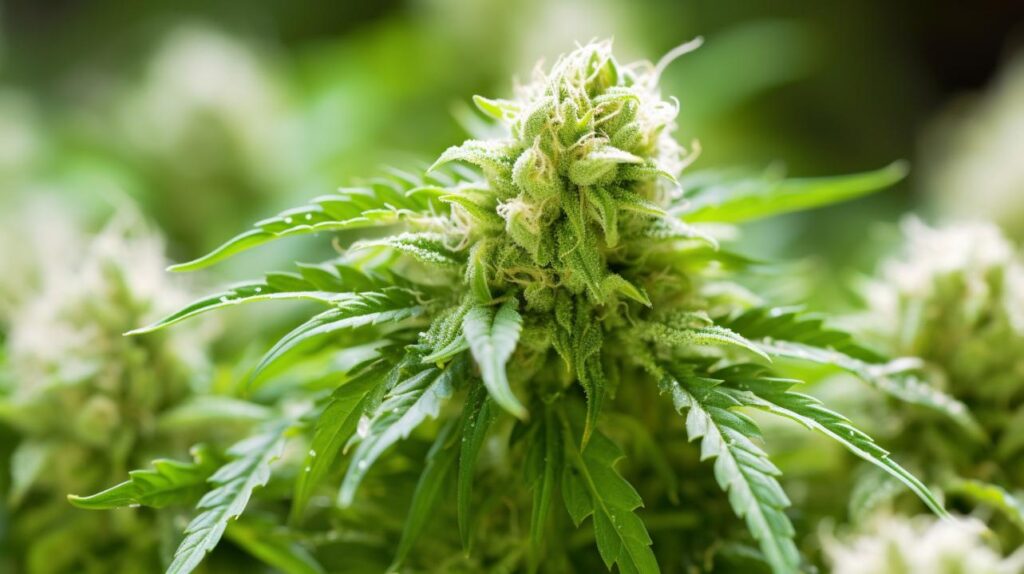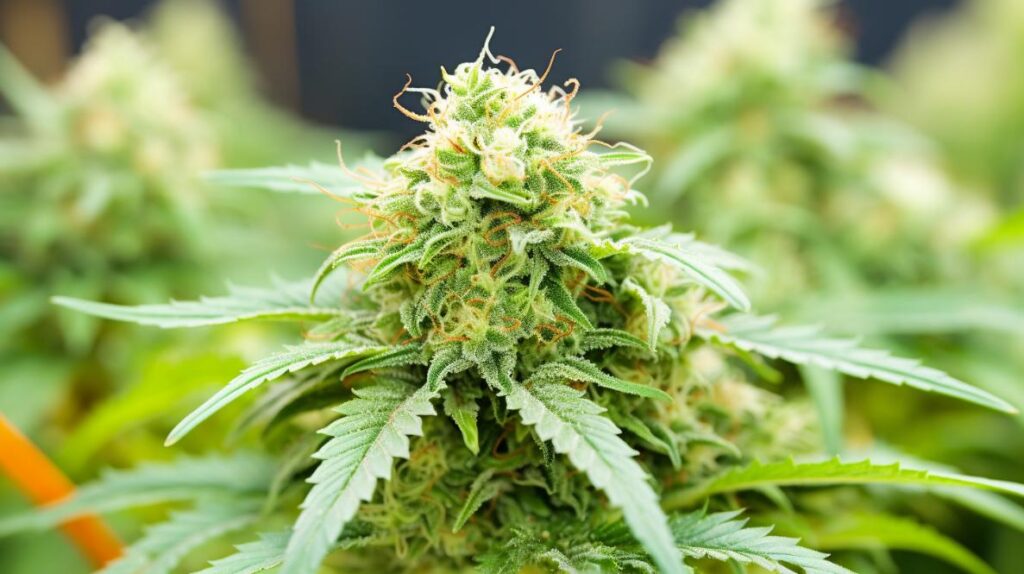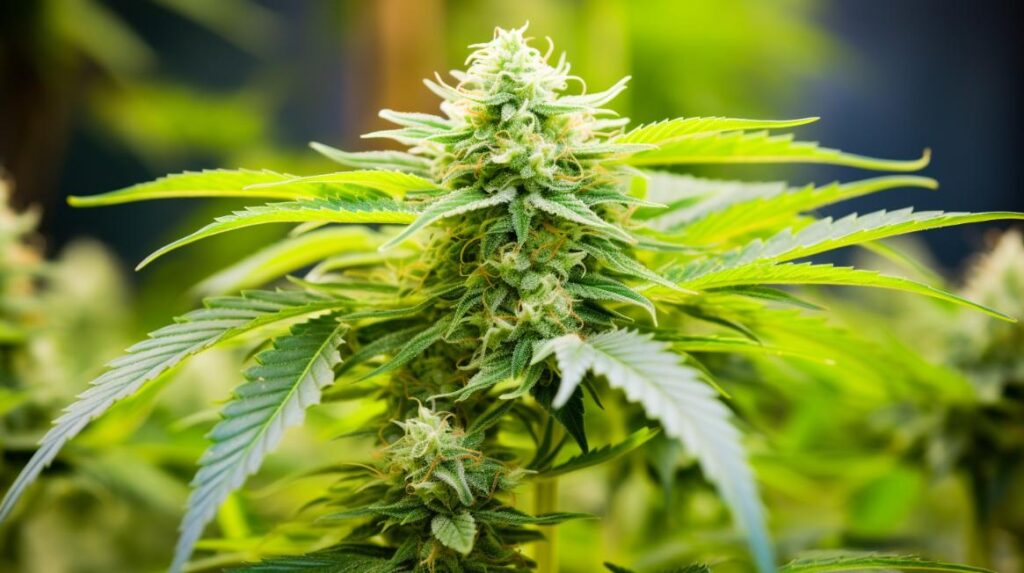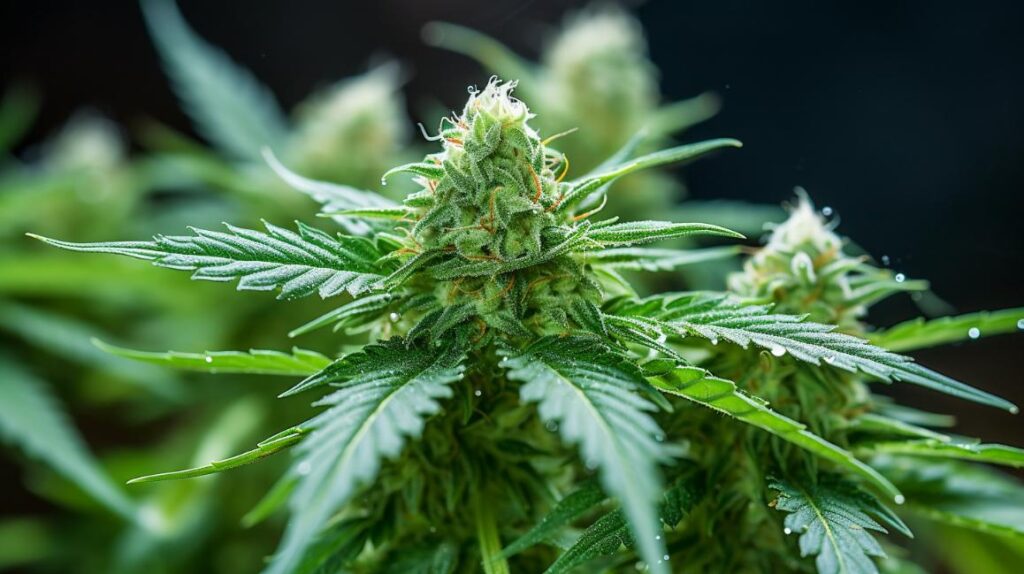Lemonberry (aka Lemonberry Kush, Lemon Berry)

The Lemonberry strain, a unique hybrid originating from the Pacific Northwest, stands out in the cannabis community for its distinct genetic lineage, combining the qualities of Dabney Blue and Lemon Thai.
This strain captures enthusiasts’ attention with its intriguing balance of effects, coupled with a terpene profile that promises a sensory journey through berry and citrus landscapes. While its lower THC content suggests a milder experience, reports of its efficacy in managing stress, pain, and anxiety highlight its potential therapeutic benefits.
Yet, the experience of Lemonberry is not without its pitfalls, as some users report adverse effects. This juxtaposition of benefits and drawbacks invites a closer examination of its role in both recreational and medicinal contexts.
Genetic Lineage
The Lemonberry strain, a distinct hybrid, emerges from the intricate crossing of Lemon Thai with Dabney Blue, weaving a complex genetic tapestry rooted in Sativa Hawaiian, Sativa Thai, and Thai origins. This unique combination showcases the strain’s sativa dominance, a characteristic highlighted by its genetic lineage, which incorporates the vibrant, citrusy flavors and energizing effects associated with Lemon Thai. The inclusion of Dabney Blue adds depth to the strain’s profile, bringing forth a nuanced aroma and flavor spectrum that distinguishes Lemonberry from other sativa-dominant hybrids.
Analyzing the genetic makeup of Lemonberry reveals a deliberate selection aimed at achieving a balanced, yet distinctly sativa-leaning experience. The Lemon Thai component is particularly striking, contributing not only to the strain’s aromatic profile but also to its cerebral effects. This ingredient’s heritage is palpable in Lemonberry’s ability to deliver an invigorating, uplifting high, a trait that aficionados of sativa strains particularly appreciate. The meticulous combination of Lemon Thai with Dabney Blue underscores a breeding philosophy that prioritizes depth of flavor and complexity of effects, ensuring that Lemonberry offers an experience that is both nuanced and memorable.
THC/CBD Content
Delving into the THC and CBD content of the Lemonberry strain reveals a potent range of 19.2% to 27% for THC and a modest 0.6% to 0.83% for CBD, highlighting its robust psychoactive potential alongside minimal cannabidiol presence. This considerable variance in THC levels underscores the Lemonberry strain’s capacity to deliver a powerful and potentially euphoric experience to its users, making it a favored choice for those seeking strong psychoactive effects. The relatively low CBD content further accentuates the strain’s recreational over medicinal use, although the presence of CBD, albeit small, may contribute to a nuanced effect profile, possibly moderating some of the more intense effects of THC.
The hybrid nature of the Lemonberry strain, resulting from the cross of Lemon Thai with Dabney Blue, introduces a complex genetic background that contributes to its distinctive cannabinoid profile. This genetic lineage not only influences the THC and CBD content but also factors into the strain’s overall appeal and user experience. Cultivators aiming to achieve the higher end of the THC spectrum must consider the specific cultivation conditions and practices, as these can significantly impact the cannabinoid levels of the final product.
Terpene Profile
A significant contributor to the Lemonberry strain’s unique sensory experience, Caryophyllene stands out as the dominant terpene, accompanied by a symphony of Limonene, Myrcene, and Valencene. The presence of these terpenes not only defines the strain’s aromatic profile but also subtly influences its taste and potential therapeutic benefits. Caryophyllene, in particular, is renowned for its spicy, peppery notes that add depth to the Lemonberry’s complexity.
The terpene profile of Lemonberry strain is meticulously balanced to create an olfactory experience that is both inviting and intriguing. Key highlights include:
- Caryophyllene: Offers a spicy, woody aroma that enriches the strain’s scent.
- Limonene: Contributes to the citrusy, lemon freshness that defines Lemonberry’s signature smell.
- Myrcene: Provides an earthy, musky undertone, enhancing the strain’s depth.
- Valencene: Adds sweet, tangy notes reminiscent of fresh oranges.
- Aromatic Experience: The blend results in a scent palette featuring floral, blueberry, vanilla, and lemon nuances.
This intricate terpene composition not only dictates the Lemonberry strain’s aromatic and flavor characteristics but also plays an essential role in defining its unique identity among cannabis connoisseurs.
Effects
Setting off on the adventure with Lemonberry strain, users often report an immediate onset of giggly, happy, and tingly sensations, marking a distinctive departure from the typical effects associated with its less potent THC profile. This unique blend, birthed from the crossing of Lemon and the illustrious Dabney Blue, cultivates an experience that is both invigorating and soothing. Despite its moderate THC levels, Lemonberry manages to deliver a robust energizing effect, casting a light on its exceptional ability to uplift the mood and stimulate the senses.
The experience of Lemonberry is characterized by a cerebral high that envelopes the mind in euphoria, punctuated by bursts of creativity and social openness. This makes it a favored choice for daytime use or social gatherings, where its berry and citrus flavors can be thoroughly enjoyed. However, it is not without its downsides, as some users may find themselves grappling with dizziness, dry mouth, and dry eyes – common detractions that remind of the need for moderation.
Analytically, the Lemonberry strain stands out for its capacity to induce happiness and laughter, yet it also underscores the importance of user awareness regarding potential negative effects. This balance between positive engagement and mindful consumption exemplifies the nuanced nature of Lemonberry’s effects.
Medical Uses
Beyond its recreational appeal, Lemonberry strain also attracts attention for its therapeutic potential, as evidenced by user reports highlighting its efficacy in stress relief, pain management, and anxiety reduction. The balanced effects of Lemonberry make it a versatile choice for those seeking relief from a variety of conditions. It’s important to note, however, that professional medical advice is recommended before using Lemonberry for medical purposes.
Key points surrounding the medical uses of Lemonberry include:
- Stress Relief: Lemonberry has been reported to provide stress relief for 28% of its users, making it a notable option for those looking to alleviate mental tension.
- Pain Management: Approximately 23% of users find Lemonberry beneficial in managing chronic pain, highlighting its potential as a natural pain relief alternative.
- Anxiety Reduction: Another 23% of users have experienced reduced anxiety levels after using Lemonberry, indicating its effectiveness in calming the mind.
- Versatile Effects: Its balanced effects make Lemonberry suitable for addressing a broad range of medical conditions beyond just stress, pain, and anxiety.
- Professional Guidance: The importance of seeking professional medical advice before incorporating Lemonberry into a therapeutic regimen cannot be overstated, ensuring safety and efficacy.
Lemonberry’s combination of therapeutic benefits positions it as a compelling choice for patients and recreational users alike, especially those dealing with chronic pain and anxiety.
Flavor and Aroma
Delving into the sensory experience of Lemonberry, the strain’s flavor and aroma profile presents a complex bouquet that immediately entices and captivates users with its unique blend of floral, fruity, and citrus notes. The aromatic fusion of floral scents intertwined with the essence of blueberry, vanilla, and lemon creates an inviting atmosphere that is both rejuvenating and soothing. This enchanting aroma draws users in, setting the stage for the flavorful journey that Lemonberry promises.
Upon consumption, the flavor of Lemonberry unfolds in layers, reminiscent of indulging in freshly baked blueberry muffins infused with a zesty twist of lemon. This distinctive taste profile is a reflection of its genetic lineage, with Lemon Thai contributing to its citrusy undertones and a sweet blueberry flavor hinting at its heritage. The exhale leaves a lingering taste of sweet and citrusy notes, enhancing the overall sensory experience.
The taste experience of Lemonberry mirrors its aroma closely, offering a delightful combination of flavors that resonate well with both new and experienced users. This seamless blend of sweet, sour, and floral notes ensures that Lemonberry remains a memorable strain for those seeking a unique taste adventure.
Appearance
The Lemonberry strain greets the observer with its visually striking dense, deep green buds accented by subtle blue hues, showcasing a proof of its genetic quality and cultivation care. The appearance of Lemonberry is not just a feast for the eyes but a proof of its exceptional lineage and meticulous growing practices.
With an analytical eye, one can appreciate the intricate details that define the allure of Lemonberry:
- Dense, deep green buds are complemented by the subtle interplay of blue hues, creating a mesmerizing visual contrast.
- A frosty layer of trichomes envelops the buds, giving them a glistening appearance that hints at the strain’s potency and resin content.
- Pistils ranging in color from orange to brown weave throughout the buds, adding depth and complexity to the overall aesthetic.
- The compact structure of the buds is a hallmark of their resinous nature, indicating a rich cannabinoid and terpene profile.
- The visually appealing nature of Lemonberry buds serves as an indicator of their quality, reflecting the care and attention devoted to their cultivation.
The appearance of the Lemonberry strain is a clear reflection of its genetic heritage and the expert care it has received, making it a standout among cannabis connoisseurs.
Grow Information
Having explored the enchanting appearance of Lemonberry, we now turn our focus to its cultivation specifics, revealing how its remarkable traits are nurtured from seed to harvest. The Lemonberry strain, a masterful hybrid between Lemon Thai and Dabney Blue, exhibits a unique cultivation journey. Its seeds, readily available online, set on a flowering cycle spanning approximately 63 days, a period during which its dynamic genetic heritage unfolds.
Bred by Grow More Fire, Lemonberry draws from a rich lineage including Animal Tree and Superboog, contributing to its robust growth characteristics and potent cannabinoid profile. The strain’s THC content ranges impressively from 19.2% to 27%, with a CBD concentration of 0.6% to 0.83%, making it a compelling choice for both recreational and medicinal users.
| Aspect | Detail | Remark |
|---|---|---|
| Flowering Cycle | 63 days | Optimal period for maturation |
| Genetics | Lemon Thai x Dabney Blue | Hybrid vigor enhances resilience and potency |
| THC Range | 19.2% to 27% | High potency level |
| CBD Content | 0.6% to 0.83% | Beneficial for medicinal users |
The dominant terpene, Caryophyllene, alongside Limonene, Myrcene, and Valencene, adds a complex aroma profile, further enhancing Lemonberry’s desirability among connoisseurs and cultivators alike.
Adverse Effects
While Lemonberry boasts an array of desirable traits for both recreational and medicinal users, it is important to note that consumption can lead to several adverse effects, including dizziness, dry mouth, and dry eyes. Despite its appealing aroma and potential benefits, users should be aware of the possible negative outcomes that may arise post-consumption. These effects not only highlight the strain’s potency but also underscore the importance of dosing appropriately based on individual tolerance levels.
In detailing these adverse effects, it is critical to take into account:
- Dizziness may occur as a sudden onset, affecting users’ balance and perception.
- Dry mouth, often referred to as ‘cottonmouth,’ is a common complaint, necessitating increased hydration.
- Dry eyes, manifesting as irritation and redness, may necessitate the use of lubricating eye drops.
- The combination of these effects can lead to a less than ideal experience if not anticipated and managed.
- Awareness and preparedness for these potential downsides can significantly enhance the overall experience with the Lemonberry strain.
Understanding these adverse effects allows users to approach Lemonberry with informed caution, ensuring a more enjoyable and controlled experience.
Comparisons with Similar Strains
Acknowledging the adverse effects associated with Lemonberry, it becomes pertinent to examine how this strain stands when it comes to flavor profile, effects, and THC potency.
Lemonberry, a product of Fusion Seeds, is a cross between Lemon Thai and Dabney Blue, inheriting a distinct flavor profile reminiscent of blueberry muffins with a lemony zest. This unique combination sets it apart from Lemonberry Kush, another variant that leans more towards a citrus-dominant palate.
Regarding effects, Lemonberry is noted for its energizing head buzz, a characteristic trait that is often compared with other strains bred in the Pacific Northwest. Unlike its relative Lemon Berry, which might display a higher sativa dominance (60% sativa/40% indica), Lemonberry offers a more balanced experience, attributable to its heritage and breeding.
Lemonberry’s THC potency is reportedly lower than average, distinguishing it from strains like Lemon Thai, which might carry a more robust THC profile. This makes Lemonberry a preferred choice for users seeking milder effects without compromising on the sensory experience, underscored by its vibrant orange hairs and the enticing fusion of berry and citrus flavors.
Research and Studies
Recent studies have investigated the unique genetic composition and terpene profile of the Lemonberry strain, highlighting its distinctive effects and therapeutic potential. As a hybrid marijuana strain with a balanced mix of Sativa and Indica genetics, Lemonberry offers an intriguing subject for research within the cannabis community. Its genetic lineage, resulting from crossing Lemon Thai with Dabney Blue, provides a complex backdrop for its notable characteristics.
Key findings from research on the Lemonberry strain include:
- Its hybrid nature, with 60% Sativa and 40% Indica genetics, offers a nuanced balance of effects, appealing to a broad spectrum of users.
- THC levels ranging from 19.2% to 27% indicate a high potency level, which could account for its pronounced psychoactive effects.
- Caryophyllene, the dominant terpene, is known for its stress-relieving properties and contributes to the strain’s therapeutic potential.
- The Lemonberry strain’s unique taste profile, reminiscent of blueberry muffins with a lemony kick, enhances user experience and preference.
- The combination of its genetic makeup and terpene profile suggests potential applications in managing stress, anxiety, and other conditions, warranting further exploration.
These research insights underscore the Lemonberry strain’s significance within the hybrid marijuana category, emphasizing its unique attributes and possible health benefits.
History and Origin
Tracing its roots back to the Pacific Northwest, the Lemonberry strain was meticulously developed by Fusion Seeds, representing a significant contribution to the hybrid cannabis landscape. This creation emerged from a deliberate and knowledgeable crossing of Lemon Thai with Dabney Blue, a process that underscores Fusion Seeds’ commitment to enhancing the diversity and complexity of cannabis genetics.
The genetic lineage of Lemonberry is rich and varied, encompassing Lemon Thai, Sativa Hawaiian, Sativa Thai, and Thai origin, which together forge a strain known for its unique aroma and potent effects.
The choice of Lemon Thai in the crossing process is particularly remarkable. Lemon Thai, a strain celebrated for its uplifting and energetic effects, brings a sharp citrus note to the hybrid, while Dabney Blue contributes a sweet berry undertone that rounds out the profile. This strategic combination has resulted in Lemonberry’s distinctive aroma, reminiscent of fresh blueberry muffins laced with a tang of lemon-butter, making it a standout among hybrid strains. The meticulous development of Lemonberry by Fusion Seeds through the crossing of Lemon Thai not only showcases their expertise in strain development but also adds a significant chapter to the history of hybrid cannabis.
Frequently Asked Questions
What Strain Is Lemonberry?
The inquiry pertains to the genetic background of a specific strain. The Lemonberry strain, a result of crossing Lemon Thai and Dabney Blue, offers a unique blend of citrus and berry flavors with various therapeutic benefits.
Is Early Lemon Berry Strain a Sativa or Indica?
The query pertains to the classification of a specific cannabis variant’s dominance. In evaluating such a variant, it is important to understand that growth conditions can influence its characteristics but fundamentally, Early Lemon Berry is a Sativa-dominant hybrid.
Is Lemon Strain a Sativa?
Lemon genetics, often found in cannabis strains, typically indicate a Sativa dominance. This is due to their inherent characteristics that promote energy and creativity, common traits associated with Sativa varieties in the cannabis industry.
Is Lemonberry Tartz a Sativa or Indica?
Lemonberry Tartz is a Sativa-dominant hybrid, notable for its blend of Sativa and Indica effects. This composition promotes a synergy of uplifting, energizing Sativa qualities with a soothing Indica-derived body relaxation, offering a balanced experience.







Responses